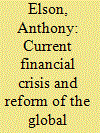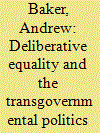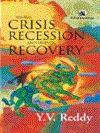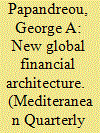| Srl | Item |
| 1 |
ID:
095382


|
|
|
|
|
| Publication |
2010.
|
| Summary/Abstract |
The current financial crisis has sparked an active debate about the adequacy of the global financial architecture (GFA) or the collective governance arrangements for promoting the stability of the international financial system which are mainly centred in the operations of the Financial Stability Forum (now Board) and IMF. There are three areas in particular in which the governance arrangements for the GFA did not work effectively in the lead-up to the current crisis: the oversight of global financial system stability, the coordination of international financial regulation, and the provision of a lender of last resort mechanism. In the light of recent G20 decisions, proposals for reform in each of these areas need to be discussed.
|
|
|
|
|
|
|
|
|
|
|
|
|
|
|
|
| 2 |
ID:
088079


|
|
|
|
|
| Publication |
2009.
|
| Summary/Abstract |
Revisiting the concept of transgovernmentalism, originally developed by Robert Keohane and Joseph Nye, can shed considerable light on the nature of interstate cooperation in contemporary global financial governance. Transgovernmentalism highlights how certain technocratic policy communities, composed of finance ministries, central banks, and regulators, dominate the global financial architecture. It also provides insights into the political and social basis of these actors' interactions and deliberations. Most importantly, renovating the concept of transgovernmentalism brings the participatory deficits in the current global financial architecture into sharp focus and points us in the direction of a workable reform agenda that would expand inclusion and participation. This article advocates basing future reform on efforts to achieve a closer realization of the principle of "deliberative equality." Unfortunately, "transgovernmentalism" is incompatible with deliberative equality, meaning that it is precisely the transgovernmental characteristics of the current global financial architecture that have to be challenged and overturned if we are to arrive at anything approximating deliberative equality.
|
|
|
|
|
|
|
|
|
|
|
|
|
|
|
|
| 3 |
ID:
128580


|
|
|
|
|
| Publication |
New Delhi, Orient Blackswan Private Limited, 2011.
|
| Description |
xxv, 421p.Hbk
|
| Standard Number |
9788125041856
|
|
|
|
|
|
|
|
|
|
|
|
Copies: C:1/I:0,R:0,Q:0
Circulation
| Accession# | Call# | Current Location | Status | Policy | Location |
| 057666 | 330.90511/RED 057666 | Main | On Shelf | General | |
|
|
|
|
| 4 |
ID:
101089


|
|
|
|
|
| Publication |
2010.
|
| Summary/Abstract |
The prime minister of Greece discusses the causes, dimensions, character, and contributing factors to the current global financial turmoil and points to lessons to be learned from the crisis in his own country. The essay underscores the potential consequences of inattention to emerging threats to financial stability, and warns that no economy is too small to have huge implications for broader economic stability. The author offers concrete recommendations for a new, transparent, and global financial architecture.
|
|
|
|
|
|
|
|
|
|
|
|
|
|
|
|